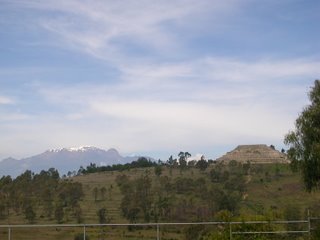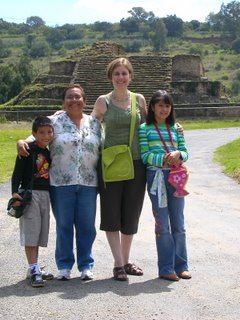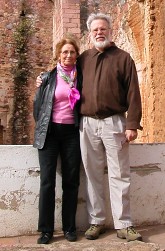Let me preface this by saying that it was intended to be included in an online forum responding to an editorial in the San Francisco (California) Chronicle about the presidential vote recount in Mexico. It is a little too sarcastic and long for them to publish so I am putting it here. Most of the Americans I know here think there should be a recount of all the votes to "calm things down." I think there is more here than whether the ideological left or right won the election, and something fundamentally more important. Christiane disagrees with me and thinks there should be a complete recount too, so this should not be taken as reflecting her views.I guess it should not surprise me that your editorial only takes a superficial view of the situation in Mexico. Or that folks on the left and right in this forum are taking their ideological stands and speaking without thinking. It’s the American way after all.
Mexico has only had democracy for a few short years. One might say that it began in the early 1990s when the federal election institute (IFE) and a separate election court (TRIFE) were established. Mexico had been under one party, strongman rule for nearly 70 years by that time, which carried on a tradition that began before Cortes, was abused by the Spanish for 300 years and later by folks like Iturbide, Santa Ana and Porfiro Diaz in the nineteenth century, and by Carranza and the PRI in the twentieth. What is strongman rule? Most Americans don’t really know, despite their (and my) dislike of folks like W., and paying lip service to democracy (or at least semi-democracy) in the U.S.
From my personal experience living in Mexico for 5 years 30 years ago, from the past six months living in Mexico, and from several years living in other third world countries where rule of law was unknown, strongman rule, even benevolent strongman rule as we had in Mexico, means that the strongman is the final arbiter of even the smallest decisions. I know, as I personally felt the results of this in the 1970s. People and businesses are afraid to make decisions on their own, and one cannot trust the institutions that are supposedly set up to protect one’s rights, as the strongman and his henchmen (in this case the PRI) break the law whenever he or they feel like it or whenever the proper palms are greased. The law says one thing, but that only holds as long at the strongman goes along. This breeds distrust in governmental institutions, contempt for authority, and a general attitude that you can do whatever you can get away with as long as you have the right friends, enough money, or don’t get caught. This is not a healthy state of affairs in a democracy.
The extra legal maneuvers by the strongman might be for the good of the country, but they are paternalistic and beyond the law. This may have been the only way to govern in Mexico after the last revolution, but it was not democracy, and it certainly was not rule of law. The president picked his successor so he would not be held accountable for actions taken while he was president, the local warlords (caciques) were paid off one way or another, and everything worked pretty well until 1968 when cracks began showing in the system. From then until the late 1980s, people began asking for more accountability, transparency, distribution of power, checks and balances, public input, etc., the things we kind of take for granted in the US until the chads hit the fan in Florida, that is.
In the early 1990s, Mexico finally set up a system with checks and balances by mutual consent and with public input to govern their elections. This system took into consideration their long experience with fraud and how to commit it, and set up a system that until this year, Mexicans could be justly proud of. It was better by far than the US systems, even in the vaunted state of California. All political parties had input into this set of laws, including the PAN (Calderon) and PRD (Lopez Obrador). It set up an election institute (IFE) that assured fair elections, and even fair campaigns (unheard of in the US). All political parties have members on the IFE that runs elections and on the election court that hears appeals (sometimes called TRIFE). And the judges are “untouchable” in the sense that they are paid nearly $500,000 a year to insulate them from bribery.
During this past election, President Fox was reprimanded by the IFE for even suggesting that PAN and/or the government promote the election, a task left up solely to the IFE, not the parties or the government, unlike in the US where we are a bit looser about such things. The IFE also reprimanded the Catholic church for taking sides and even speaking out on the election. (Mexico has had a long and checkered relationship with the church, but that’s another story.) The IFE did not really get on Lopez Obrador’s case for using Mexico City funds to help his campaign, but they sure tried to keep the federal government from helping Calderon’s campaign and rightly so. Other than that the campaign was pretty tame by US standards, despite some name calling and easily offended sensibilities on one side or the other.
Over the past decade the IFE has run the cleanest election system in Mexico’s history. When a losing candidate has appealed to the TRIFE, an independent organization, they have reversed elections at the local and state level of all major parties. As a result, the PRD and PAN have lost some and won some, and in general everyone, including foreign observers, agree that the system has been fair and even-handed. In fact, the PRI is currently challenging a local election just won by the PRD, and the PRD is refusing a recount. Ironic when you think about it. But the TRIFE will settle it, and all parties will end up going along. In this case, the PRD trusts the TRIFE.
The 2006 federal election is the cleanest, most-transparent, well-run election in Mexico’s history, and perhaps in all of Latin America, with the possible exception of Costa Rica. The past decade had built up people’s confidence in the fact that they could set up a legal system that actually worked, and one that was the bedrock of everything else that happens politically in the country.
The election, despite being clean, undoubtedly had underhanded things happening and human error. But if you saw, as I did, the precinct tally sheets posted all around town with signatures from members of all the major parties, including the PRD; and if you watched the election night returns and listened to the president of IFE saying the election was too close to call, and that they could not call a winner using computer projections (like we do in the US), and thus everyone would have to wait a few days to get an actual count; and if you saw him pleading with the political parties to hold off on claims of victory until the count was in; you could not help but believe that the election was well run and was following the law. The whole business about the IFE hiding 3 million votes until the final vote count was in is hogwash, as the IFE said on election night that there were about 3 million disputed votes that would need to be counted. They were never missing, at least if you watched television on election night.
Now it is crunch time. If the election had not been close, none of this would have mattered much, but it was very, very close. And how well the system Mexico put into place for just such a situation will be tested as never before, and at the presidential level for the first time. The question is not simply whether one party won or another lost. This election and how Mexico handles it is a referendum on rule of law; on people’s faith in an institution that they, not a strongman, set up; on whether they are capable of building their own future or will have to revert back to a strongman system, no matter how benevolent. If they fail, it will set back true democracy in Mexico an additional 70 years, and continue a pattern that is already over 500 years old.
The system is following the course set out by law. By law the IFE cannot reopen ballot boxes to satisfy a disgruntled customer. That is for the TRIFE to decide. The IFE followed its rules, caught blatant cases of error (the 3 million “missing” ballots) and turned everything over to the TRIFE as they were supposed to do. Now they are being castigated by Mexicans who know better, and US editors who don’t. Opening ballot boxes is not for the candidates or their parties to decide either.
From the very beginning, and presumably in the name of democracy, Andres Manuel Lopez Obrador (AMLO) and the PRD have been asking for something that is straight out of the strongman days. They claimed victory against the wishes of the IFE on election night in hopes of causing enough commotion to scare everyone else off and plant a seed of doubt. This last week AMLO has again declared himself president. That has not worked so far. Sixty percent of the voting public thinks the PAN won and that the elections were essentially clean.
AMLO and the PRD then presented what they considered evidence of massive fraud and conspiracy to the TRIFE as provided by law and demanded a complete recount. This was despite the fact that around a million common citizens were involved in the vote and vote count and acted as observers with foreign observers who also said the vote was clean. The level of bribery would have had to have been beyond anything seen anywhere, and keeping it quiet would be even more unbelievable. Appealing on the basis of possible vote fraud is their right and why the TRIFE was set up to begin with, but there has already been a vote by vote count that was signed off on by representatives of the PRD and the other major parties. AMLO now claims that his own people, selected by his party, were paid off by the other parties in a massive conspiracy. There has been no evidence of this, and it shows his lack of trust in even his own people.
Before the results were in from the TRIFE last week, AMLO and the PRD staged massive street protests supported by the Mexico City government (the PRD mayor of Mexico City has publicly offered to accept the political consequences of this activity) claiming fraud, and these have now extended to traffic blockages of the financial and political center of Mexico City. (It was the quietest I had ever seen the Avenida Reforma as my wife and I strolled up to Juarez.) And despite calls for non-violence by AMLO, there has been a general understanding that things will get rough unless there is a complete recount. AMLO has stated in his speeches that they will protest and increase the level of the protests until he is announced the winner. Of course, when he is interviewed by US papers, he modifies that to something along the lines that he just wants a full recount.
The TRIFE, following the Mexican law, not Californian law or US law or even Florida law, are only supposed to order a recount of votes in precincts if there is realistic evidence of a pattern of fraud or other irregularities. They can require a complete recount, but need to have some proof of a massive fraud to do so. Anything less would be succumbing to rule by strongman, not rule by law. They just cannot do it because a vocal minority and some misdirected US newspapers think they should. They can also toss out the entire vote and start over, but again they need some basis for doing so. Doing anything else, such as sitting down with Calderon and AMLO to come to a gentleman’s agreement on a recount, or taking the Catholic church up on its offer to “mediate” the “dispute”, or getting President Fox to promulgate a decree ordering a recount is not rule by law, and represents a reversion to everything the 1990s elections laws were set up to prevent. And it will mean going back to the bad old days of the PRI.
Much more is at stake here than whether the PRD or the PAN won the election. This fledging democracy, that basically had a revolution in the 1990s, needs to develop confidence in itself and its institutions, breaking the law to keep US newspaper editors and a minority of voters happy is too much to pay to prevent street protests.
Is Mexico a society of the very rich and the very poor? Have the poorer Mexicans been given a bad deal for the past 500 years? Should the government do more? The answers are absolutely yes. And Calderon has invited AMLO and the PRD to form a national government to approache these issues to little avail. But rather than changing things through a strongman system, no matter how good the motives, caving in to demands for a full recount outside the TRIFE will perpetuate the very same paternalistic (on a good day) or dictatorial (on a bad day) system that needs to be changed. AMLO is just another politician who wants to do things his way, just like Iturbide, Porfiro Diaz, and all the PRI presidents of the twentieth century. I think Mexico deserves true democracy with leaders who believe in and live by rule of law, transparency, and personal responsibility.
Questioning the system and throwing around words like “fraud” and “traitor”, and threatening undefined activities in order to change how the electoral institutions work is an attempt, whether conscious or not, to undermine their effectiveness and the public’s incipient faith in its ability to manage and maintain true democracy. This is serious stuff and US newspapers editors should start paying attention, and get a little education.
 Xochitecatl archaeological site with Ixtacihuatl in the background as viewed from the Cacaxtla archaeological site.
Xochitecatl archaeological site with Ixtacihuatl in the background as viewed from the Cacaxtla archaeological site. 





